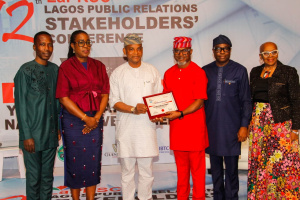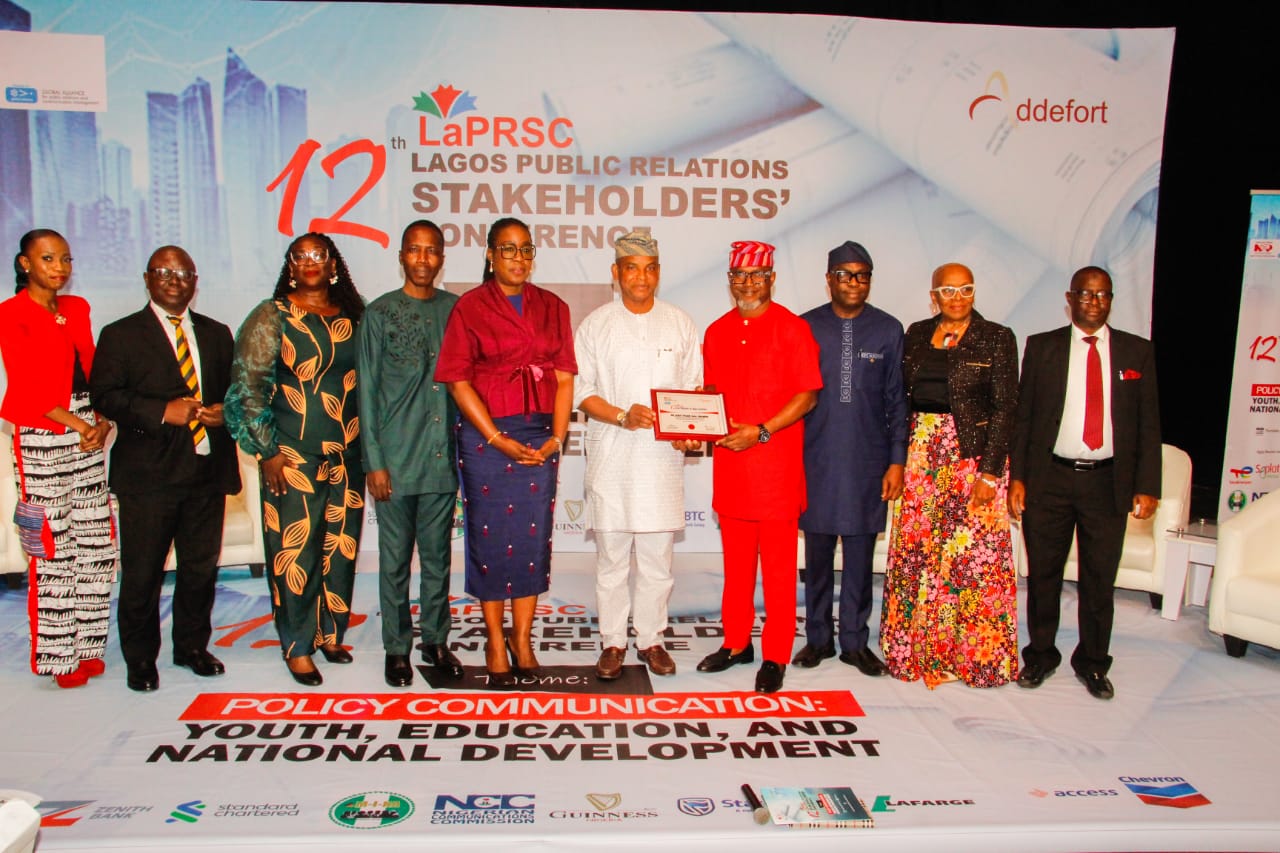…Gov Sanwo Olu commends LaPRSC’s organisers for sustaining the platform
The Nigerian Institute of Public Relations (NIPR), Lagos Chapter, in strategic collaboration with the Addefort Limited successfully hosted the 12th Lagos PR Stakeholders’ Conference, focusing on the compelling theme: “Policy Communication: Youth, Education and National Development.” The high-impact event brought together communication professionals, policymakers, youth leaders, educators, and development advocates to examine the critical role of strategic communication in shaping Nigeria’s future.
Held at the MUSON Centre, Onikan, Lagos on Thursday August 28, 2025, this year’s edition spotlighted how effective communication of policies—particularly in the sectors of youth engagement and education—can serve as a catalyst for sustainable national development.
Mr Babajide Sanwo Olu, Governor of Lagos State in his address commended the organisers for sustaining the platform over the years as a rallying point for stakeholders in public relations, governance, corporate leadership, and civil society.
“For twelve years, this conference has provided the space to discuss solutions, share experiences, and design pathways to move our nation forward.” he said
According to him, “The theme of this year’s conference—Policy Communication: Youth, Education, and National Development”, speaks directly to the realities we are facing as a people and to the choices we must make to secure our future. Because, at the end of the day, our economy, our politics, our security, our prosperity, rests on the shoulders of our young people and the education they receive.”
“When we speak of youth, education, and national development, we are really talking about creativity and innovation. Nigeria is fortunate to have one of the largest youth populations in the world, which is a great strength. However, if we fail to channel this energy effectively, do not provide the right education, or communicate policies in ways that truly engage young people, this strength can quickly become a challenge. That is why gatherings like this are so important — they bring together diverse voices and expertise to shape policies that directly impact our youth, our education system, and ultimately, our nation’s progress.”
On the efforts of the government, he explained that “Our education reforms, including the EKOEXCEL initiative which is transforming primary schools, alongside our investment in digital literacy for secondary school students, are concrete policies that directly uplift our youth. But what makes these policies succeed is not just their design—it is the way we involve parents, teachers, communities, and, of course, the students themselves. We have learned that when people understand the “why” and the “how,” they give their full support.”

The Lagos State government was represented by Mr. Jamiu Tolani Alli- Balogun, Commissioner for Basic and Secondary Education and Mr Kayode Oyekanmi, Director Strategic Centre Ministry of Information and Strategy.
The Guest speaker, Prof Chiso Ndukwe- Okafor, Executive Director, highlighted the need for professional communicators to actively bridge the gap between government intentions and public perception, ensuring that government policies are not just announced, but explained, contextualized, and internalized in ways that drive understanding, acceptance, and action.
She explained that the theme for this year, could not have been more timely, “As a nation with one of the world’s largest youth populations, our future will be defined by how well we educate, empower, and engage our young people. Policy, no matter how well intentioned, loses its essence if it is not effectively communicated, understood, and embraced by the people it seeks to serve.”
In his welcome remark, the Chairman, NIPR Lagos, Dr Samuel Ayetutu called on stakeholders to embrace proper communication. He noted that “Policy communication is not just about dissemination; it is about building trust, ensuring inclusivity, promoting transparency, and inspiring ownership. When policies around youth and education are communicated clearly, accurately, and credibly, they become instruments of transformation that can unlock innovation, productivity, and sustainable national development.”
“As communication professionals, our role is to bridge the gap between policymakers and the public, ensuring that government policies are not just announced, but explained, contextualized, and internalized in ways that drive understanding, acceptance, and action.” He added
Speaking on the idea behind the theme, the Convener, Mr Olabamiji Adeleye, Lead Consultant, Addefort Limited, explained that this year’s theme, reflects the urgent need to bridge the widening gap between policy formulation and public understanding especially in the context of youth engagement and educational reform. “We are at a defining moment as a nation, where effective communication of policies is no longer a luxury but a necessity for inclusive development.”
“Our youth represent both the present and the future. They are critical stakeholders who must be informed, engaged, and empowered. Likewise, education remains the cornerstone of any thriving society. However, without clear, transparent, and inclusive communication strategies, even the most well-intentioned policies risk being misunderstood, misrepresented, or ignored” he said.
Other distinguished speakers include; Dr Aminu Maida, Executive Vice Chairman, NCC; Mr Oluwafemi Ogundeji, Managing Director, Vertex Micro Insurance; Mrs Onome Odili, Chief Executive Officer & Founder, Breaking Cycle Africa Foundation, and Ms. Lesijolu Eite Eric-Nwabuzor, Executive director, Comms Avenue.
The Panel Session was moderated by Mr Olusegun Mcmedal, Council Member Nigerian Institute of Public Relations.
Topics covered included: Communicating Education Reforms for Impact; Youth Engagement in Policymaking; The Role of Public Relations in Rebuilding Trust in Institutions; Counselling and Career development; Leveraging Digital Platforms for Inclusive Communication.
The participants called for increased investment in youth education, clearer policy messaging, and a stronger role for public relations in governance.


